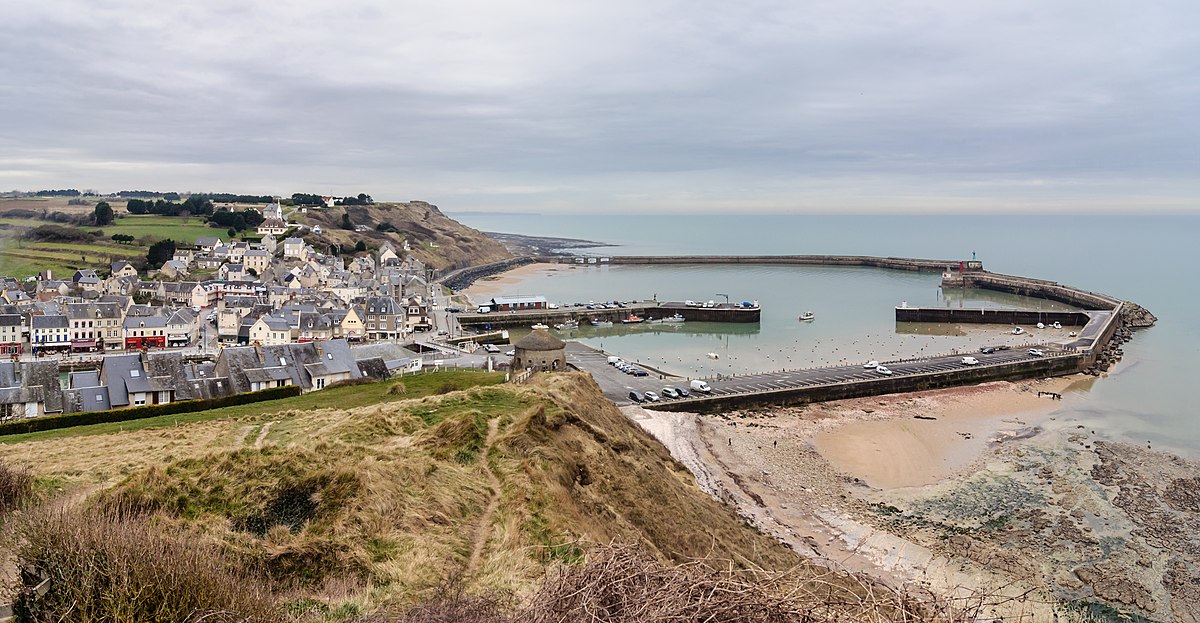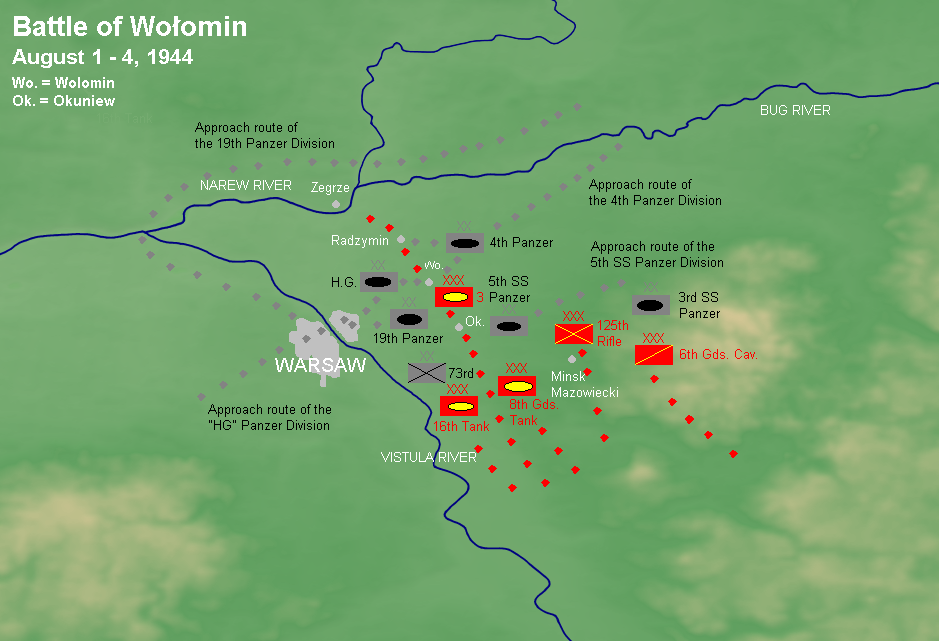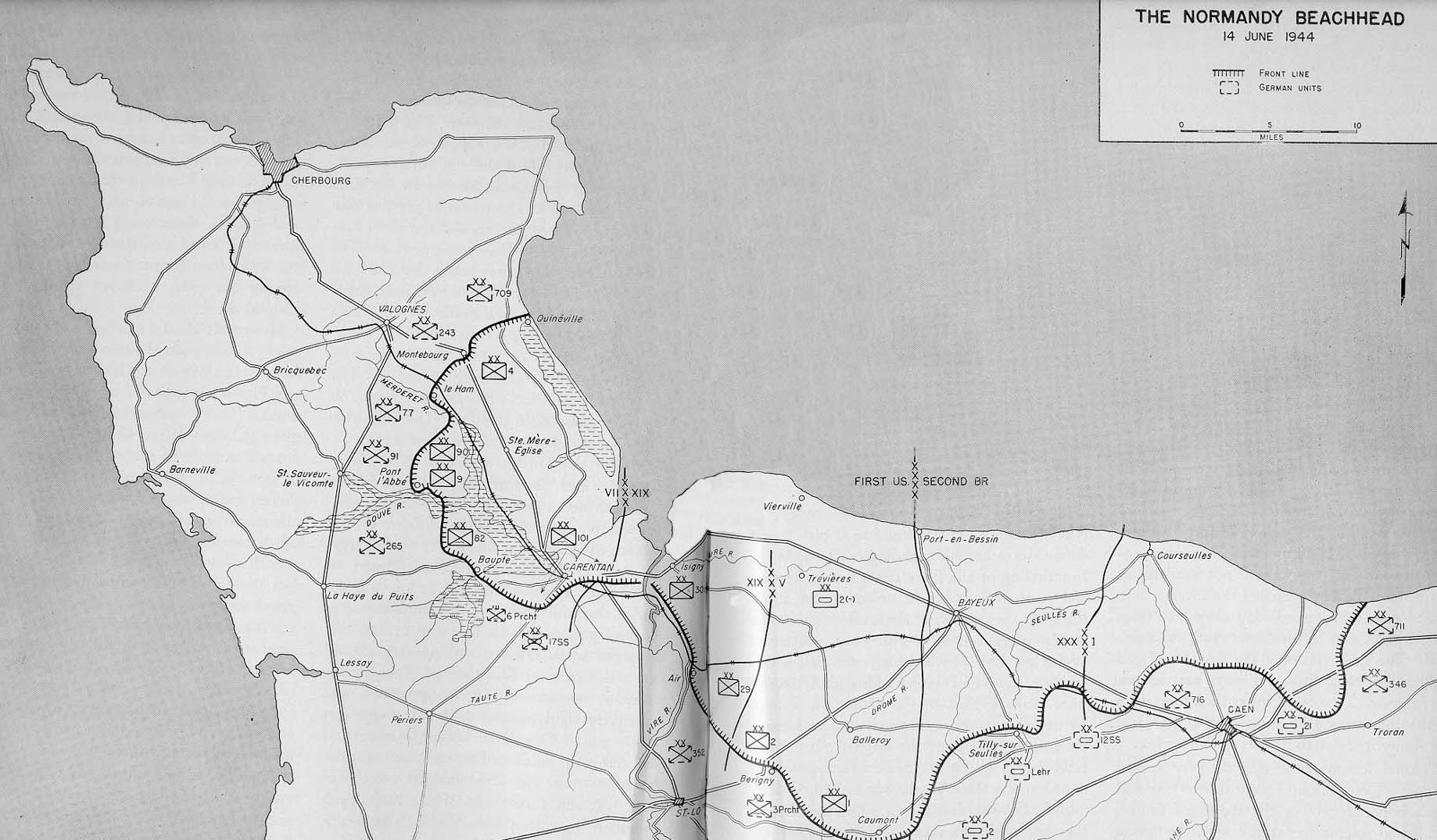sillygoose
Well-known member
.jpg)
What If the Omaha Beach Landing Had Failed?
An Allied failure would have made a second invasion of northwestern Europe unlikely.
But what if only one of the five D-Day landings had failed? The obvious candidate is the assault on Omaha Beach, which historically did come close to disaster:
It is the morning of June 6, 1944. From the bridge of the heavy cruiser USS Augusta, General Omar N. Bradley peers through binoculars at the French beachhead code-named Omaha. The sky is overcast, the waters choppy, and the view ashore partially obscured by smoke and explosions. But the sketchy information Bradley has received, and everything he sees, indicates that the assault on Omaha is failing. Elements of two divisions—the veteran 1st Infantry and the untested 29th Infantry—are desperately trying to fight their way from the shoreline to the bluffs from which Germans manning mortars and machine guns are devastating everything on the beach. The American forces are all but paralyzed.
Bradley feels helpless. He will describe these hours as "a time of grave personal anxiety and frustration." Eventually he decides the landing force has suffered an irreversible catastrophe, and orders the men ashore to withdraw. This proves impossible. Communications breakdowns keep many landing craft from even heading to shore. Of those that do, many are sunk en route or destroyed on the beach while they wait for pinned-down infantrymen to crawl toward them. For all practical purposes, the landing force is wiped out.
This devastating defeat leaves a 37-mile gap between the Canadian and British beaches to the east and the other American beach, Utah, to the west. Bradley knows that the 4th Infantry Division landings at Utah have gone unexpectedly smoothly, with only light casualties. But he also knows that with the Omaha force liquidated, Germans at that beach could shift toward Utah and launch a deadly attack on its left flank. Bradley could transfer elements of the Omaha force not yet ashore to reinforce Utah. In practice, this is impossible. To reposition, the 4th's follow-on waves must reach shore, which will take hours. With no contingency for the 1st and 29th to land at Utah, the flotilla of transports and warships assigned to Omaha likely would unleash chaos if suddenly inserted into the fleet assigned to Utah.
The above scenario is historically correct in most respects. The Omaha landing did come within a hair's breadth of failing. As Adrian R. Lewis points out in Omaha Beach: A Flawed Victory, the rigid plan for the landing simply fell apart amid the withering German fire, the dispersal of small units, and the deaths of many officers and NCOs. Soldiers ashore had to improvise a new approach. Only their valor in inching toward and destroying obstacles barring access to the beach exits prevented catastrophe. Bradley did consider evacuating Omaha Beach, but most military historians agree that he could not have done so, and that given the intricate nature of the D-Day landings, the transfer of the 1st and 29th to Utah likely would have meant chaos, not salvation, for the 4th Division troops already ashore.
Proponents of counterfactual theory speak of "nodes of contingency"—points in time at which events that went one way could have gone another. The D-Day invasion involved so many nodes of contingency that it would be absurd to say with certainty what would have occurred had the Omaha assault failed. It is reasonably certain that forces on the three Canadian and British beaches—Gold, Juno, and Sword—would have retained their foothold on the French coast. D-Day, then, would not have met with complete disaster.
But it is plausible that all available German forces near Utah, including the 352nd Infantry Division that historically defended Omaha Beach, would have descended on Utah Beach to contain or even destroy the invading forces. Airdrops of two American paratroop divisions behind Utah Beach to secure bridges and causeways the 4th Division needed to break out of the beach were historically scattered widely. They would have been unlikely to survive a well-organized German counterattack aimed at Utah. If the Allied presence on Utah remained intact, those forces' isolation from the other beaches would have made an advance inland difficult if not impossible. Even the Allies' overwhelming command of the air would probably not have sufficed to retrieve the situation.
Historically the Allies required six weeks to break out of their beachhead, due largely to the French hedgerow countryside that provided the German troops with a succession of nearly perfect defensive positions.
Loss of Omaha would have made an Allied breakout even more difficult. Loss of both Omaha and Utah might well have transmogrified the D-Day landings into something resembling the January 1944 landings at Anzio, Italy, where the beachhead became a trap that held the equivalent of three British and American divisions until May—able to break out thanks only to the approach of Allied forces creeping up the Italian mainland. Normandy offered no such option. Of Anzio, British Prime Minister Winston Churchill said, "I had hoped we were hurling a wildcat onto the shore, but all we got was a stranded whale." Overlord might have become a stranded whale, with implications far more serious than at Anzio.
In war, structural forces often count for a great deal. The American arsenal of democracy, for example, guaranteed that Japan could not win the Pacific War. But sometimes the actions of a few men are crucial. That was so at Omaha Beach, where a few hundred soldiers may have saved the entire Normandy invasion from calamity.
It is the morning of June 6, 1944. From the bridge of the heavy cruiser USS Augusta, General Omar N. Bradley peers through binoculars at the French beachhead code-named Omaha. The sky is overcast, the waters choppy, and the view ashore partially obscured by smoke and explosions. But the sketchy information Bradley has received, and everything he sees, indicates that the assault on Omaha is failing. Elements of two divisions—the veteran 1st Infantry and the untested 29th Infantry—are desperately trying to fight their way from the shoreline to the bluffs from which Germans manning mortars and machine guns are devastating everything on the beach. The American forces are all but paralyzed.
Bradley feels helpless. He will describe these hours as "a time of grave personal anxiety and frustration." Eventually he decides the landing force has suffered an irreversible catastrophe, and orders the men ashore to withdraw. This proves impossible. Communications breakdowns keep many landing craft from even heading to shore. Of those that do, many are sunk en route or destroyed on the beach while they wait for pinned-down infantrymen to crawl toward them. For all practical purposes, the landing force is wiped out.
This devastating defeat leaves a 37-mile gap between the Canadian and British beaches to the east and the other American beach, Utah, to the west. Bradley knows that the 4th Infantry Division landings at Utah have gone unexpectedly smoothly, with only light casualties. But he also knows that with the Omaha force liquidated, Germans at that beach could shift toward Utah and launch a deadly attack on its left flank. Bradley could transfer elements of the Omaha force not yet ashore to reinforce Utah. In practice, this is impossible. To reposition, the 4th's follow-on waves must reach shore, which will take hours. With no contingency for the 1st and 29th to land at Utah, the flotilla of transports and warships assigned to Omaha likely would unleash chaos if suddenly inserted into the fleet assigned to Utah.
The above scenario is historically correct in most respects. The Omaha landing did come within a hair's breadth of failing. As Adrian R. Lewis points out in Omaha Beach: A Flawed Victory, the rigid plan for the landing simply fell apart amid the withering German fire, the dispersal of small units, and the deaths of many officers and NCOs. Soldiers ashore had to improvise a new approach. Only their valor in inching toward and destroying obstacles barring access to the beach exits prevented catastrophe. Bradley did consider evacuating Omaha Beach, but most military historians agree that he could not have done so, and that given the intricate nature of the D-Day landings, the transfer of the 1st and 29th to Utah likely would have meant chaos, not salvation, for the 4th Division troops already ashore.
Proponents of counterfactual theory speak of "nodes of contingency"—points in time at which events that went one way could have gone another. The D-Day invasion involved so many nodes of contingency that it would be absurd to say with certainty what would have occurred had the Omaha assault failed. It is reasonably certain that forces on the three Canadian and British beaches—Gold, Juno, and Sword—would have retained their foothold on the French coast. D-Day, then, would not have met with complete disaster.
But it is plausible that all available German forces near Utah, including the 352nd Infantry Division that historically defended Omaha Beach, would have descended on Utah Beach to contain or even destroy the invading forces. Airdrops of two American paratroop divisions behind Utah Beach to secure bridges and causeways the 4th Division needed to break out of the beach were historically scattered widely. They would have been unlikely to survive a well-organized German counterattack aimed at Utah. If the Allied presence on Utah remained intact, those forces' isolation from the other beaches would have made an advance inland difficult if not impossible. Even the Allies' overwhelming command of the air would probably not have sufficed to retrieve the situation.
Historically the Allies required six weeks to break out of their beachhead, due largely to the French hedgerow countryside that provided the German troops with a succession of nearly perfect defensive positions.
Loss of Omaha would have made an Allied breakout even more difficult. Loss of both Omaha and Utah might well have transmogrified the D-Day landings into something resembling the January 1944 landings at Anzio, Italy, where the beachhead became a trap that held the equivalent of three British and American divisions until May—able to break out thanks only to the approach of Allied forces creeping up the Italian mainland. Normandy offered no such option. Of Anzio, British Prime Minister Winston Churchill said, "I had hoped we were hurling a wildcat onto the shore, but all we got was a stranded whale." Overlord might have become a stranded whale, with implications far more serious than at Anzio.
In war, structural forces often count for a great deal. The American arsenal of democracy, for example, guaranteed that Japan could not win the Pacific War. But sometimes the actions of a few men are crucial. That was so at Omaha Beach, where a few hundred soldiers may have saved the entire Normandy invasion from calamity.
This article brings up an interesting What If about the failure of only one of the Normandy beaches. I'm curious about the implications for the rest of the campaign and war. Please read the article before commenting, since a lot of the objections that would normally come up are addressed by the author.
The POD is that Kampfgruppe Meyer, the corps reserve waiting south of Omaha but historically was ordered back and forth to deal with various reported threats that didn't end up existing, is instead properly directed toward Omaha before noon on June 6th. It avoids the air attacks it endured once the skies cleared after noon and doesn't get ordered to go after Gold Beach in the afternoon as per OTL. So it makes the break out from Omaha impossible and convinces Bradley to cancel further landings after the 2nd wave is defeated.
This means V Corps cannot get to shore for several days, as all the landing schedules for other beaches are too stacked and rigid to let them in. Survivors of the 1st division aren't able to be deployed, nor are the 29th, 30th, and 2nd armored divisions. The Rangers also have to leave Pont Du Hoc, so that remains in German hands and a 37 miles gap between Utah and Gold beaches is the result. Not only that, but it forces the British forces at Gold to divert units that would have otherwise pushed south to expand the flank toward Omaha beach.
The historical first such operation:

Battle of Port-en-Bessin - Wikipedia
A big problem due to the 352nd division now being freed up to oppose them on June 7th. Obviously not the entire division, just most of it. Which means 50th infantry and later on 7th Armoured are diverted from their historical push south from the beaches. That means Panzer Lehr and 2nd Panzer can move in to contain Gold beach as well as support the 352nd division, something important since the 3rd Parachute division then also appears too about the same time. That least the British-Canadian beaches contained, since they don't have enough of a beachhead to deploy more units and the Mulberry Harbors can't be built at Omaha or Port-en-Bessin.
Utah similarly cannot link up with Omaha then and faces more German divisions while isolated. A big problem after the 10th of June:

Battle of Carentan - Wikipedia
There would be no 2nd Armored deployed without Omaha, so the 17th SS would route the 101st from Carentan and block any further effort to break out to the south.The 17th SS PzG Division counter-attacked the 101st Airborne on 13 June. Initially successful, its attack was thrown back by Combat Command A (CCA) of the U.S. 2nd Armored Division.
That's also not to mention that Pont du Hoc staying in German hands means they have the ability to observe and shell Utah beach. The Maisy battery would also not be silenced, as the Rangers came through the Omaha beachhead to launch their attack on June 9th:

Maisy battery - Wikipedia
So it would seem the invasion would be contained in a way even worse than Anzio. The Germans couldn't push them back into the sea due to NGF and air support, but could keep them stuck indefinitely and unable to deploy more divisions. The question is how long the Allies want to maintain their beachheads and sustain casualties holding them, as the Germans are bound to reinforce and increase artillery fire on them.
There is then the chance of a follow on invasion in the South of France, which would be reinforced by the V Corps:

Operation Dragoon - Wikipedia
Does it make sense to maintain costly bridgeheads until August to launch that invasion? Certainly waiting for Stalin to launch Bagration on June 22nd is a worthwhile goal to keep them going. That offensive in the east would certainly happen, though by July things would be very different, as the II SS Panzer would stay in Ukraine and be a big problem for the Lvov-Sandomierz offensive and 1st and 2nd SS Panzer divisions could be spared for helping IV SS at Warsaw, which likely would mean the loss of the entire 2nd Tank army (nearly destroyed IOTL) and damage to several other Soviets units:

Battle of Radzymin (1944) - Wikipedia
So what then? Normandy turns into Anzio, but worse for the Allies, while Bagration is still a disaster for Germany but the aftermath would see the Soviets getting hurt pretty badly too around Moscow and the Baltic area. Lwow-Sandomierz might fail if II SS Panzer corps is still in place. Dragoon could still happen after the Germans shift forces east once Normandy is contained and help roll up the southern front in France, but would that be enough to break the deadlock around Normandy?
What happens with a worse summer 1944 for the Allies and the Germans sparing themselves major disasters? Could it be enough to tip the 1944 election against FDR? IOTL he was heavily boosted from being behind due to a successful Normandy and capture of Paris in August.

